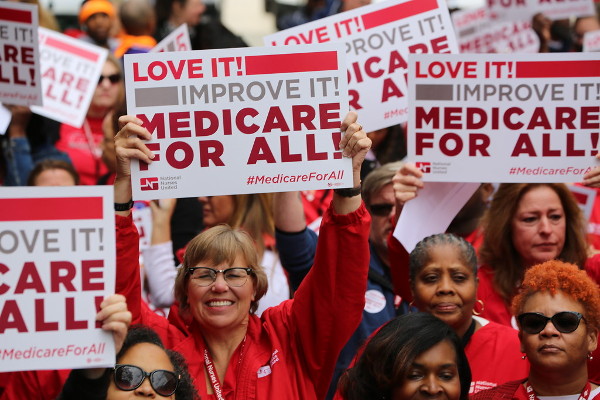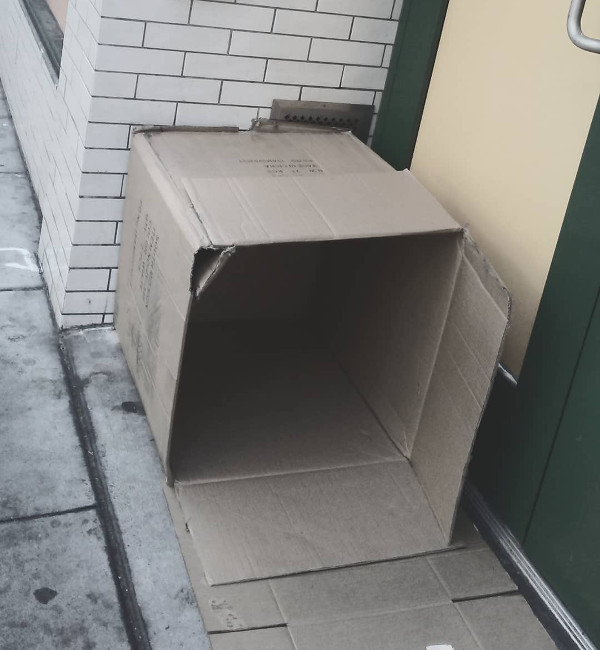
PHOTO/JACLYN HIGGS, NATIONAL NURSES UNITED
The crisis in our country is arousing millions of people to bring their demands for economic survival and a just society to the arena of the 2020 elections. On this page, we briefly summarize the positions of the four currently top-polling Democratic presidential primary candidates on two key issues: Health care, and housing and homelessness. We’ve also highlighted the thinking of a couple of lower-polling Democratic candidates who have put forward ideas on the challenges technology brings society and a strong anti-war platform.
We hope these summaries can help our readers determine what program might best help “we, the people” continue our fight for a society and government that serves the people, not the corporations and billionaires. We will publish similar features in upcoming editions.
Views of the four top-polling candidates on healthcare and housing/homelessness
Joe Biden
Health care: Biden says he will protect Obamacare and build on it with a plan he says will insure more than 97% of Americans. He favors a “public health insurance option” similar to Medicare, to give people a choice between private insurance and the public option. The public option would negotiate lower prices from hospitals and other health care providers. Medicare would be able to negotiate drug prices with pharmaceutical corporations, and there would be limits on drug price increases.
Housing/homelessness: Biden’s only plan on housing sets a national goal of ensuring 100% of formerly imprisoned people have housing after leaving prison. Biden would direct the U.S. Department of Housing and Urban Development to only contract with entities that are open to housing individuals “looking for a second chance.” And he would expand funding for transitional housing.
Elizabeth Warren
Health care: Warren would defend Medicaid and Obamacare, but also enact Medicare for All. To bring down drug prices, the Department of Health and Human Services would manufacture generic drugs in certain cases, and Medicare would aggressively negotiate with drug companies. She also favors importing drugs from other countries when that is the cheapest way to get them.
Housing/homelessness: Warren says her plan would invest $500 billion over the next 10 years to build, preserve, and rehab units that will be affordable to lower-income families. A big chunk of that investment leverages private dollars. The plan would be paid for with an increase in inheritance taxes on the wealthy. It would also help first-time, low-income homebuyers in formerly redlined or segregated neighborhoods to buy a home. Warren says her plan will bring down rental costs by 10% by increasing the supply of affordable housing, and by changing land-use rules that drive up housing costs. Warren has not stated a plan to provide immediate relief to the homeless.
Bernie Sanders
Health care: Sanders favors a Medicare-for-All, single-payer program that would replace private health insurance with a public plan that covers everyone. He advocates allowing Medicare to negotiate drug prices with pharmaceutical companies, allowing patients and pharmacists to buy drugs from other countries, and passing legislation that would cut prescription drug prices in half.
Housing/homelessness: Sanders announced a $2.5 trillion housing plan that would include ending homelessness and limiting rent increases across the country by imposing a national rent control standard. Over the next decade, he said his plan would expand public housing, increase the availability of affordable housing and cap annual rent increases nationally, regardless of income, at no more than one and a half times the rate of inflation or 3 percent, whichever is higher. His plan would also create a first-time homebuyer
assistance program.
Kamala Harris
Health care: Harris would protect Obamacare, and her plan would extend Medicare to everyone over a 10-year transition period. Private insurers could offer Medicare plans. At the end of the 10-year transition, every American would be a part of this new Medicare system, getting their insurance either through the new public Medicare plan or a Medicare plan offered by a private insurer. Harris’s plan would also audit prescription drug costs to ensure pharmaceutical companies are not charging more than other comparable countries.
Housing/homelessness: Harris has not stated a plan to provide relief to those already homeless. She has introduced in the Senate a Rent Relief Act that would provide a tax credit for people spending 30% or more of their income on rent and utilities. She also proposes that the government invest $100 billion to provide down-payment and closing-cost assistance to four million homebuyers who rent or live in historically red-lined communities.
Some strong ideas on other crucial issues
Andrew Yang
Yang is the only candidate who has focused on the fact that technology is eliminating jobs and people’s incomes. Yang says, “In the next 12 years, 1 out of 3 American workers are at risk of losing their jobs to new technologies—and unlike with previous waves of automation, this time new jobs will not appear quickly enough in large enough numbers to make up for it.” To avoid what he calls “an unprecedented crisis,” he proposes a Universal Basic Income (UBI) of $1,000 per month to be paid to all U.S. citizens over the age of 18, with no conditions attached. Current welfare and social program beneficiaries would be given a choice between their current benefits or the $1,000 a month. Yang’s UBI would be paid for by consolidating some welfare programs and implementing a Value Added Tax of 10 percent.
Tulsi Gabbard
Gabbard is a major in the U.S. Army National Guard and is the first female combat veteran to run for president. She has made peace and diverting military spending to other purposes a central issue in her campaign. She says, “As president I will end these counterproductive and wasteful regime change wars, work to end this new Cold War and nuclear arms race, and take the trillions of dollars that we’ve been spending and invest those resources in serving the needs of the American people—healthcare, education, rebuilding our crumbling infrastructure, protecting our environment. There are many urgent needs here that we need to address and we’ve got to get our priorities straight.”

PHOTO/SARAH MENEFEE

